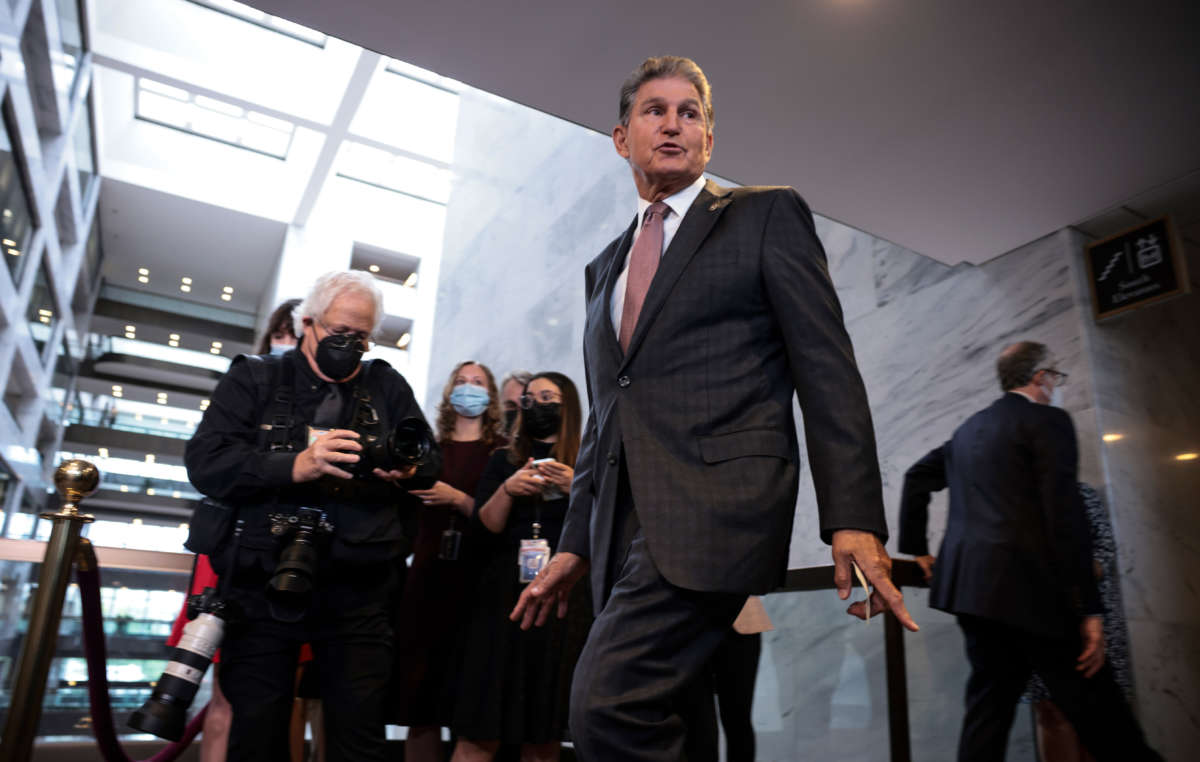Honest, paywall-free news is rare. Please support our boldly independent journalism with a donation of any size.
Democratic Sen. Joe Manchin’s proposal to lop $2 trillion off his own party’s social spending and climate agenda would support nearly two million fewer jobs per year than the full $3.5 trillion reconciliation plan backed by President Joe Biden, progressive lawmakers, and a majority of the U.S. public.
According to new research published Thursday by the Economic Policy Institute (EPI), every single congressional district across all 50 U.S. states and Washington, D.C. “would see fewer jobs supported” under the $1.5 trillion top-line figure Manchin has offered than under the $3.5 trillion proposal known as the Build Back Better Act.
A previous EPI analysis estimated that the reconciliation package combined with the Senate-passed bipartisan infrastructure bill — the two central components of Biden’s domestic policy agenda — would support more than four million jobs each year, on average, over a decade.
“The Build Back Better agenda would make critical investments to deliver relief to financially strained households, raise productivity, and dampen inflation pressures to enhance America’s long-term economic growth prospects,” said Adam Hersh, a visiting economist at EPI and the author of the new analysis. “Further reducing the scale and scope of the budget reconciliation package unequivocally means the legislation will support far fewer jobs and deliver fewer benefits to lift up working families and boost the economy as a whole.”
Hersh pointed specifically to the impact that Manchin’s proposed cuts would have on the senator’s home state of West Virginia, which would see 9,880 fewer jobs each year — “equivalent to 1.33% of the state’s overall employment” — under the $1.5 trillion alternative, hampering the state’s recovery from the most unequal recession in modern U.S. history.
“West Virginia would be no better off in terms of jobs in fossil fuel industries,” Hersh found, “but would see 900 fewer manufacturing jobs, 400 fewer construction jobs, and 3,800 fewer healthcare and social assistance jobs.”
The analysis also estimates that Arizona — the home state of Sen. Kyrsten Sinema, another right-wing Democrat who has objected to the $3.5 trillion plan — would see 35,564 fewer jobs annually under Manchin’s alternative, including “2,500 fewer manufacturing jobs, 1,600 fewer construction jobs, and 11,400 fewer healthcare and social assistance jobs.”
“Senators Joe Manchin and Kyrsten Sinema’s efforts to scale back Build Back Better can only leave working families worse off and America’s economy less resilient to the challenges we face now and in the future,” Hersh warned.
NEW: Nearly 2 million fewer jobs per year would be supported if the budget reconciliation package is cut from $3.5 trillion to $1.5 trillion.
See how many fewer jobs your state and congressional district would expect: https://t.co/5ieCN4rPiG pic.twitter.com/mSJgwJ62hz
— Economic Policy Institute (@EconomicPolicy) October 7, 2021
The EPI analysis came as congressional Democrats continued their efforts to reach an agreement on the proposed reconciliation package, which is expected to include substantial investments in green energy, child care, housing, Medicare expansion, and more. House Speaker Nancy Pelosi (D-Calif.) is pushing her caucus to strike a deal before the end of the month.
Manchin, Sinema, and a handful of other corporate Democrats in the House and Senate have publicly objected to a variety of initiatives proposed under the Build Back Better agenda, imperiling its chances of passing Congress fully intact.
While emphasizing that they view $3.5 trillion in spending over 10 years as a significant compromise from their earlier demands, progressive lawmakers have said they’re willing to further negotiate the proposed top-line reconciliation figure — as long as their priorities aren’t gutted. One option floated by Rep. Alexandria Ocasio-Cortez (D-N.Y.) and others is to fully fund key programs but shorten their duration, thus reducing the overall cost of the package.
But Rep. Pramila Jayapal (D-Wash.) — the chair of the Congressional Progressive Caucus — and grassroots advocacy groups have said they will not accept a figure as low as Manchin has offered.
“We want to be very clear: the conservative, underfunded $1.5 trillion proposal is an absolute non-starter,” Claire Guzdar, spokesperson for the ProsperUS coalition, said in a statement earlier this week. “Any additional cuts to the Build Back Better agenda would threaten the fragile economic recovery and represent a massive missed opportunity for President Biden and Congress to deliver the real and lasting results for families and communities they promised. Underfunded, means-tested half-measures won’t meet the needs of families, communities, or the economy.”
A terrifying moment. We appeal for your support.
In the last weeks, we have witnessed an authoritarian assault on communities in Minnesota and across the nation.
The need for truthful, grassroots reporting is urgent at this cataclysmic historical moment. Yet, Trump-aligned billionaires and other allies have taken over many legacy media outlets — the culmination of a decades-long campaign to place control of the narrative into the hands of the political right.
We refuse to let Trump’s blatant propaganda machine go unchecked. Untethered to corporate ownership or advertisers, Truthout remains fearless in our reporting and our determination to use journalism as a tool for justice.
But we need your help just to fund our basic expenses. Over 80 percent of Truthout’s funding comes from small individual donations from our community of readers, and over a third of our total budget is supported by recurring monthly donors.
Truthout has launched a fundraiser to add 310 new monthly donors in the next 4 days. Whether you can make a small monthly donation or a larger one-time gift, Truthout only works with your support.
